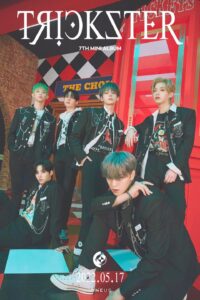
“Doesn’t matter how many of you are there, the moment anything hits me. Come at me, bring it on.”
Oneus’ Trickster is an elaborate and baffling addition to the group’s overall worldbuilding, but the songs it contains are angsty in the best ways. The concept of the trickster takes on multiple meanings involved with gambling, hubris, mystery, and a bit of sleight of hand while the members compare the unpredictability of life to poker. With everything on the line, listeners are encouraged to bluff and race towards success in spite of it all. The joker or trickster is seen as the key to gaining the upper hand in this struggle, but how it is acquired lies solely on one’s ability to outwit, outbluff, and outplay everyone else. However, the elusive wild card can upend the game, and consequently, life as we know it as well.
The concept of the trickster is most easily noticed in the intro and title track for the album. “Intro : Who Got the Joker?” is an explosive track that describes life as a “string of choices” with “endless question marks” and prominently features the raw, unapologetic convictions of the members to “decide how it all ends”. The refrain “got the joker” is a stark contrast to the remainder of the song. Though short, “Intro : Who Got the Joker?” sets the tone for the rest of Trickster.
Included with this album are also two cinematic short films, co-produced by Zanybros and RBW. The first one, “Ep. 1 Trickster : The Choice is Ours” sees the members encountering a strange faceless figure wearing black clothes and being given black and red cards with a pictogram and a suit like you would find in a standard card deck. After meeting the figure, the members are thrust into a dangerous “choice game” in which their decisions hold seemingly grave consequences.
The following episode “Ep. 2 : Who Got the Joker?” continues the story with Xion. After drinking a bottle of water found in front of him, he is grabbed from behind by Hwanwoong (his jacket is the same), rather than the faceless antagonist like one might expect. However, the turning point of the video is when RAVN finds himself in a dilapidated room with walls covered with cryptic posters. He takes several selfies in front of them before noticing that the pictures together spell the phrase “find the true joker.” The scene changes and the image of RAVN is seen through a surveillance camera with a date in January of 2023, a little over seven months into the future (from the album’s release). Seoho then comes face to face with the faceless figure again, grasping his card tightly and dashing forward seemingly to fight his ambusher. Then, the next to last scene has Hwanwoong and Xion at a table together before the scene again cuts to surveillance camera footage only to reveal that they are being watched by a totally different Oneus, one that is dressed all in white. As they wryly smolder into the camera, the scene cuts to an unsuspecting Keonhee holding one of the joker cards. As he examines it, a black hood is forced over his head and it cuts to the credits.
These two episodes seem to suggest that a meta version of Oneus are the ones pulling the strings (Matrix-style) and the members are merely players in a twisted game. However, developments in the MV suggest otherwise. The beginning of the MV shows meta Oneus tied up and hooded like Keonhee was at the end of “Ep. 2 : Who Got the Joker?”. Likewise, the members in the MV all seem to commit to their respective choices in the game in order to subvert expectations and break free from the game, as seen in the way Oneus triumph by taking alternate means to success (Xion stopping the wheel of death, Leedo breaking the mirror, Hwanwoong escaping the elevator, Keonhee deliberately detonating the explosives, RAVN surviving eating the apple, and Seoho boxing it out with the antagonist) rather than wearily succumbing to the expected consequences.

It may be important to note also that this subversion of expectation lends itself to the trickster narrative set up through the album’s concept. With a bit of sleight of hand and reckless abandon (imagine if Loki and DC’s The Joker were one person), Oneus are able to upend the game completely.
However, while many are likely familiar with the titular DC Comics villain, the joker is also a wild card in the classic game Euchre. Modeled after the image of a jester, the joker became a staple in card decks as far back as the 1860s. Since then, it has come to be used in a variety of games, including poker, the enigmatic game of chance and strategy that has permeated popular culture, especially in the United States. Its imagery as a jester is no accident given its significance in card games is as a card that can easily mean the difference between winning and losing a hand of poker and depending on the stakes… life or death, if action movies are any indication.
For Oneus, the “true Joker” is both a figure and a tool, the person who holds the key to turning the tides of the “Choice Game.” Given the topsy turvy, time travel-y slant that the episodes take, it would seem one of the members brings the rest together in order to give the slip to their ambushers. On a purely speculative level, Oneus’ most recent releases seem to suggest this hypothesis as well. The title track for Binary Code, “Black Mirror” is a vintage funk song reminiscent of Michael Jackson, “Luna” from Blood Moon is a contemporary and traditional fusion, while “Bring It On” catapults listeners forward into a punky, angsty future. Ironically, only time will tell what the repercussions might be for their overall album lore, and if the marquee in the MV is any indication, that might be slated for January 13, 2023.

The remaining songs on the album are just as fun and slightly unhinged as the title track and intro. One of the most unique, “Mr. Wolf,” portrays the members as love-hungry players that yearn to give in to their animalistic instincts. Lyrics like “it’s the dinner time” and the catchy “nananana” chorus make the song singable and enticing, like a hunter to its prey. The production is exciting and funky with an animalistic growl and screaming added before the final reiteration of the chorus. Between the bounciness of the music, addictive hook, and usage of non-musical sounds, “Mr. Wolf” is an enjoyable and fitting addition to Oneus’ discography, especially opposite their Lived and Devil albums.
The two middle songs “Skydivin’” and “Firebomb” are fiery and carefree. Both songs encourage listeners to throw away their inhibitions and take a risk on love. “Skydivin’” has a lighter, more summer-y vibe created from a combination of groovy bass and busy gang vocals. Each member has their own lines, but they converge for a multitude of vocals layers in the chorus. There is also a tasteful selection of vocal chops that act as ornamentation overtop the melody.
The latter song “Firebomb” equates the feeling of falling in love to a ticking time bomb. Sonically it is more rock-sounding with a midi drum kit and catchy bassline in the forefront of the sound. At the chorus drop, the vocals fall out to trade off with a distorted midi instrument melody (it sounds like it might be a modified saxophone patch). With that being said, the bassline is the hero here alongside Oneus’ vocals; it frames nearly the whole song and ties the rock-forward sound and midi instrumentation together nicely.
Additionally, it utilizes the idiom “두 눈 빠지도록” or “until one’s eyes fall out” if translated literally. It reinforces the narrative in the song about relentlessly pursuing love for as long as it takes to win over the listener. The idiom is a nice touch considering its English title, “Firebomb,” is an explosive device literally meant to start a fire (catch the heart on fire, get it?)

The outlier on the album is “Fragile.” It is an up-tempo ballad that evokes imagery of a crush so white-hot that the pursuer fears falling too hard and fast for a lover that they destroy both of them in the process. References to hot and cold and the way they exist in harmony and disharmony to each other run throughout the song. However, the sound of the song is overall smooth and understated. The vocals here are interwoven with block synthesizer chords and a high-hat heavy drum kit. The bass is prevalent as well, but mostly remains constant and out of the way of the rest of the layers in the production.
With an explosive title track, remarkable storytelling, and tasteful variety within the tracklist, Trickster provides a nice compliment to Oneus’ recent discography. While the B-sides do lend themselves to the conceptual aim and sound of the overall tracklist, it is really the intro and title track doing the heavy lifting in furthering Oneus’ overall worldbuilding since Binary Code. With the introduction of such drastically different sounds and concepts but with cohesive storytelling and time travel thrown into the mix, the possibilities are seemingly endless going forward.
(YouTube [1][2][3][4], Bicycle Cards, Britannica. Images via RBW Entertainment)


